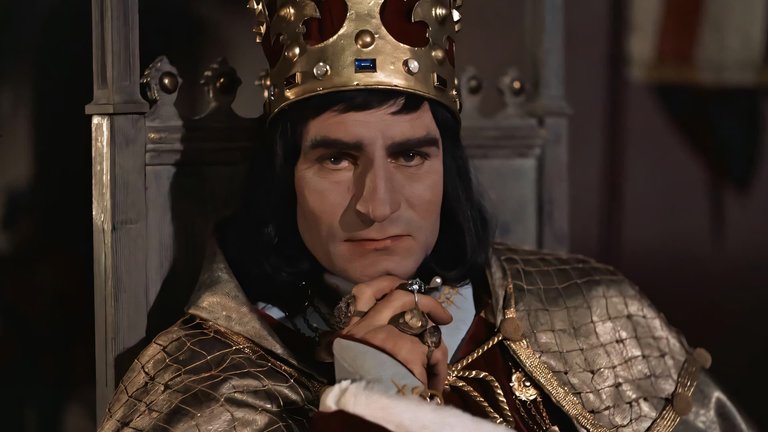Film Review: Richard III (1955)

Sir Laurence Olivier, widely regarded as one of the greatest Shakespearean actors of the 20th Century, left an indelible mark on cinematic history through his directorial adaptations of the Bard's plays. Among these, his 1955 interpretation of Richard III stands out for its critical acclaim and lasting impact among film scholars. This film can be seen as a sequel to Olivier's 1944 directorial debut, Henry V, in which he portrayed the celebrated English warrior king.
The plot is set more than half a century after events depicted in Henry V. It begins in 1471, during Wars of the Roses, in which House of York prevailed over rival House of Lancaster, thus making Edward IV (played by Cedric Hardwicke) as new King of England. Richard, Duke of Gloucester (played by Olivier) is Edward’s brother. Despite being part of the winning faction, Richard's discontent grows as he covets the throne for himself. Over the next fourteen years, his cunning and ruthlessness enable him to eliminate all those preceding him in line of succession, culminating in his ascension to the throne as King Richard III. But his vile actions, including cold-blodded murder of Edward’s young children in the Tower of London, appear too much even for his supporters. When army led by young Henry Tudor (played by Stanley Baker), the last remaining pretender from Lancaster side, lands in England, English people and nobles flock to his side leading to final confrontation with Richard’s forces at Bosworth Field.
Richard III was one of the last major productions of London Films, famous studio founded by Alexander Korda, legendary British film mogul. This British answer to Hollywood's "larger-than-life" historical epics sought to utilise widescreen format and bright colours to compete with the emerging threat of television. However, Richard III suffered from an unusual premiere strategy in the United States, where it was released simultaneously in theatres and on television, ultimately hampering its initial box office returns and critical reception. The latter became improved only after its 1966 theatrical re-run.
Richard III is, however, mainly Olivier's film, built upon his 1944 Old Vic stage adaptation. Aware that Richard III is one of the longest of Shakespeare's plays, Olivier had cut out many subplots and characters to create a smoother and more comprehensive narrative. Despite these efforts, the film clocks in at over two and a half hours long and retains some of Shakespeare's more flowery dialogue, which may pose challenges for modern audiences. The first part of the film can also be somewhat difficult to follow for viewers unfamiliar with the complicated dynastic politics of England during the Wars of the Roses era.
However, things improve significantly in the second part of the film, as Richard's Machiavellian actions and their aftermath take on a more recognizable form. This leads to a climactic showdown that takes place at the famous Battle of Bosworth Field, which looks impressive despite being reconstructed on Spanish olive groves instead of an authentic English location.
Olivier's masterful performance is undoubtedly the standout aspect of the film. It is even more impressive when compared to his role in Henry V, where he played a heroic monarch responsible for England's greatest military triumph. In Richard III, Olivier portrays one of the vilest kings in English history with great skill, using the breaking of the fourth wall to underline the contrast between his courteous demeanour and his outrageous intentions. His looks and mannerisms were inspired by stage producer Jed Harris, whom he despised like many of his colleagues. The result is one of the most effective and iconic portrayals of a villain in the history of British cinema.
Olivier is also aided by an impressive cast, including three fellow knights: Sir Cedric Hardwicke as King Edward IV, Sir John Gielgud as Richard's unfortunate brother George, Duke of Clarence, and the exceptional Sir Ralph Richardson as Richard's main ally and co-conspirator, Duke of Buckingham. Richardson is probably only among the cast members who leaves truly grand impression and in some scenes even manages to upstage his long-time friend and rival Olivier.
Richard III may not be as imaginative as some of the newer, more "cool" interpretations of Shakespeare's text, but it nevertheless should be recommended as a very "old school" historic epic that might give insight to new audiences not only into one of the greatest actors that ever lived but also into kind of films that they don't make any more.
RATING: 7/10 (+++)
Blog in Croatian https://draxblog.com
Blog in English https://draxreview.wordpress.com/
InLeo blog https://inleo.io/@drax.leo
Hiveonboard: https://hiveonboard.com?ref=drax
Rising Star game: https://www.risingstargame.com?referrer=drax
1Inch: https://1inch.exchange/#/r/0x83823d8CCB74F828148258BB4457642124b1328e
BTC donations: 1EWxiMiP6iiG9rger3NuUSd6HByaxQWafG
ETH donations: 0xB305F144323b99e6f8b1d66f5D7DE78B498C32A7
BCH donations: qpvxw0jax79lhmvlgcldkzpqanf03r9cjv8y6gtmk9
Posted Using InLeo Alpha